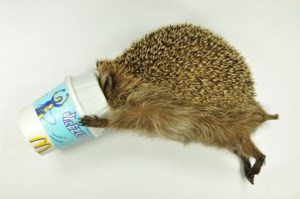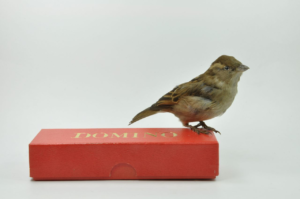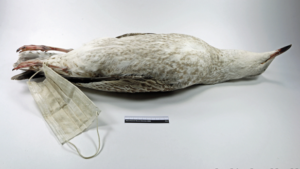করোনা তোমাকে বলছি: Corona/Karuna
door Debjani Paul
The face mask has been a common sight during this pandemic. Face masks mainly protect others since it stops the spreading of droplets produced by the wearer when coughing, talking or singing. Plenty of animals have also come across face masks by now, particularly the blue disposable type. Face masks that end up in nature are often found or accidently moved by wild animals. Animals can get their legs tangled in these face masks, for example. The natural history museum in Rotterdam recently added a new exhibit to their collection: ‘face mask seagull’. The seagull had become entangled in the face mask elastics and died. The seagull has been included in the ‘dead animals with a story’ collection, between the ‘domino sparrow’ and the ‘McFlurry hedgehog’.


In September 2020, the British animal welfare charity, the RSPCA, received 900 reports of animals that had become entangled in face masks. It is not just face masks that have been discarded in the street but plastic gloves, plastic packets of disposable handkerchiefs and used handkerchiefs as well. Volunteer Pieter Rambags who picks litter on the Regte Hei nature area near Goirle has noticed an increase in litter too. ‘The amount of litter has doubled and I now see rubbish in locations that used to be ‘clean’.’ The amount of litter in Amsterdam also differs depending on the location. There is less litter in Haarlemmertrekvaart than in Westerpark, for example.
